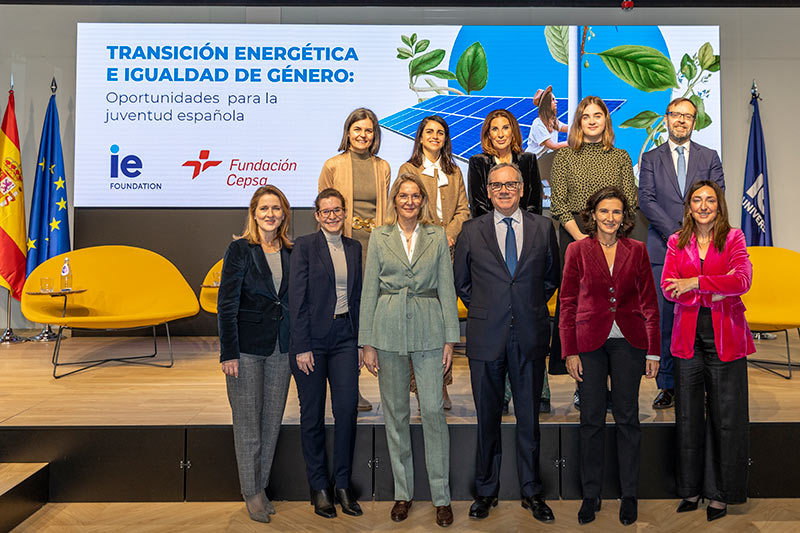Thursday, January 11, 2024
The 'Energy Transition and Gender Equality: Opportunities for Spanish Youth' report reveals that the energy transition will bring more employment and equity for boys and girls
By Miguel Ángel García Vega
There is no way to fool a mirror. The image you see is reality. Spain has a decades-long problem with unemployment for young people (under 25 years old). According to the National Statistics Institute (INE), the rate was 27.8% in the third quarter of the year. Lowering it is a countrywide challenge. There are, however, oases, spaces where the economy can see through the not-totally-overcast sky, where light and optimism shine through. "Of the jobs offered by Linkedin (in its Green Skill Report), 10% are associated with green skills," explained Ramón Pueyo, Head of Sustainability and Corporate Governance Services at KPMG Spain.
The energy transition towards sustainability is a tremendous refuge in the face of the storm. Young people, who are the present and future, see work differently. The report on the Energy Transition and Gender Equality: Opportunities for Spanish Youth (prepared by Fundación IE and Fundación Cepsa) shows a new generation and a different way of understanding the planet and work. COP28 has shown that some of these young people are prepared to take care of the world. And this advocacy - as seen in the work of IE and Cepsa - yields numbers so incontrovertible that they could even be approved by Isaac Newton. To summarize, "this change represents an opportunity for economic and social transformation; a way to improve gender equality, for example." A total of 72% of young people are highly aware of the importance of caring for the environment and one in three values working in "areas related to this area and new energy sources." Let's delve deeper into that rate. 74% are women and 72% are men. And half of young people want to be more actively involved in shaping climate policy. In exchange, "they are asking for economic stability and paid internships," remarks Andrea González Henry, 23, president of the Spanish Youth Council. And it's because their message is very powerful. "We have taken to the streets, and we have made it clear that we don't know what planet we are going to live on," she concluded. This is exactly what they are demanding. They are speaking out and raising their voices.
Those words and that call are reverberating like an echo and reaching the United Kingdom. "Youth unemployment is due," says Nicholas Barr, Professor of Public Economics at the prestigious London School of Economics and Political Science (LSE), "to two problems: the mismatch between the skills that young people have and the skills that employers need." And something else: the lack of flexibility in the labor market. "The ecological transition is an opportunity to reduce unemployment, but young people need to acquire these skills and markets need to respond to almost constant economic and technical changes," he recommends. "The workforces need to be constantly trained." We have the example of Cepsa," remarks Isabela del Alcazar, Chief Sustainability Officer at IE University, who has been training executives for 15 years. "It has changed its business model from oil and gas to renewables, which requires new skills. Employees who are part of the company and also young people entering for the first time need to have these new skills."
This is the present. However, these new generations are keeping their hands on the flowering earth: they are tending their grass harps. "One in three young people is considering working in fields related to the environment and new technologies," says the paper, as we have seen. She adds: "Although we must promote opportunities that promote gender equality in the energy sector, it is essential to ensure a fair and equitable transition to more sustainable energy." This entails changing a system of studies that has been almost the same for five decades. This is at least part of the main pillar of the energy transition. "Sustainability should constitute cross-disciplinary education, including the entire educational cycle," Isabela del Alcázar recommends.
It is a way of thinking, an identity, that spans oceans. "The transition will create new technical jobs as well as construction, installation and maintenance jobs," says Mauro Guillén, vice dean at the Wharton School of the University of Pennsylvania. He adds: "I know many young university students who even want to be entrepreneurs in this space, and quite a few of them are studying finance to figure out how to get their green projects off the ground."

Goodbye to those five words—which did so much damage at the time—that a start-up was a place to "move fast and break things." It falls like a drizzle, a constant rain of change. The energy transition is the perfect map and territory for gender equality. "Spain is going through a unique, incredible time. This transformation aids equity." And it is not just anyone saying it. That is the voice of Elena Pisonero—former president of Hispasat—the leading satellite company in Spain. She is a woman who once shattered the glass ceiling to reach for the stars. A pioneer. Much has been written about the lack of women as role models for others as one of the problems that accounts for the lack of women studying STEM (science, technology, engineering, and mathematics). New technologies. But some of them are already here. For example, Sara García (León, 1989), a researcher at the CNIO (Spanish National Cancer Research Center) and a member of the European Space Agency (ESA) astronaut pool. "My dream is to travel [at just 35 years old] to space. I hope to make it," she says, with a never-ending smile and smooth red hair. In fact, she outperformed 22,500 candidates in the selection process. She knows it's difficult. Europe requires the agreement of 27 countries. She is waiting for her turn to take off.
The study sees the green transition as a way to attract more women to the fastest growing energy sectors (e.g. renewable energies) and therefore—it should be noted—it is essential to close the gender gap in relation to the number of men. "And this starts at school, where sustainability should be cross-disciplinary education, including the entire educational cycle," advised Isabela del Alcázar.
Perhaps there is no one in Spain as qualified to write these lines as the philosopher and writer José Antonio Marina. An "institution" when it comes to talking about classrooms. First, he resorts to memory. The International Labor Organization (ILO) estimates that the decarbonization of the economy will result in the loss of about six million jobs, but those created will increase fourfold, from 11 to 43 million during 2030 in those countries committed to renewable energies. Some 16 million workers will switch to new jobs relating to clean energy.
Second, he outlines the effort involved in any transformation. "Companies must adapt to the new energies. This is why policies to support the transition and retraining of employees are recommended to the States," he stresses. And like the saying goes: It's all in the books: "We have to learn at any age and at an ever faster pace in the face of the unprecedented advancement of technology and, therefore, of the energy transition." At the same time, he opens the page with a simile. " Nobody was asked if they wanted to use a computer. We had to do it so that we wouldn't be left out of the job market. That is why it is important for organizations to learn how to generate talent through the people who are already integrated. And that changes over time and over a lifetime," he says. A green, young, egalitarian and positive world is coming. "There is a doomsday message. But we're working on finding solutions and creating opportunities. We must champion the optimistic narrative. We have to work hard. We are in the generation of change, and it will bring many excellent options. And certainly for young people," says Mónica Chao, president of WAS (Women Action Sustainability). END
Miguel Ángel García Vega
He has been writing for EL PAÍS for some 25 years, currently for Cultura, Negocios, El País Semanal, Retina, Suplementos Especiales, and Ideas. His texts have been republished by La Nación (Argentina), La Tercera (Chile) or Le Monde (France). He has received, among others, the AECOC, Accenture, Antonio Moreno Espejo (CNMV) and Ciudad de Badajoz awards.
¿Te ha parecido interesante?





